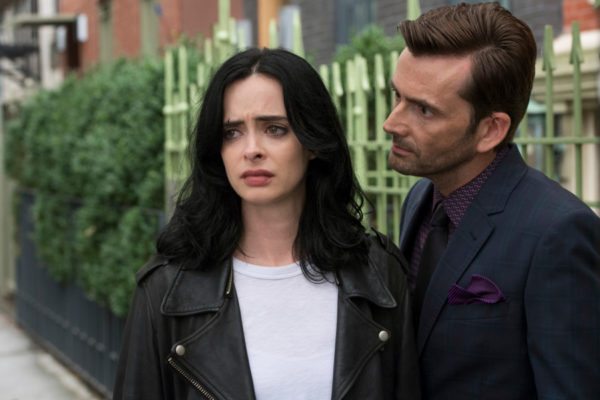Matt Rodgers reviews the eleventh episode of Jessica Jones season 2…

In the aftermath of Jessica’s first act of murder, you might find yourself asking why she’s electing to frame what was self-defense against a serial killer, with evidence to prove it, as a suicide. It feels like a stupid move for someone who knows how to work the system. And then the voices in her head dilute to one recognisible brogue, before he’s there in front of her, clapping sarcastically as she disposes of the body from a rooftop. Ladies and gentleman, Kilgrave is back, and boy have we missed him.
David Tennant’s absence from the show has at least afforded a different kind of Netflix series from the ‘big bad’ norm, but within the first five minutes he’s uttering “I know all the quaint sidestreets of you mind” in reptilian fashion, and you’re reminded what a unique villain Kilgrave was. As good as Janet McTeer’s Alisa has become as the focal point of season 2, especially here as she veers from feral to motherly within a heartbeat, nothing quite creeps you out like Kilgrave appearing behind a showering Jessica.

‘AKA Three Lives and Counting” really plays on the horror elements that have permeated this season. The psychological abuse inflicted on Jessica is more distressing than any physical threat to her.
That leaves the body horror for Trish, whose voluntary mutilation at the hands of Dr. Karl provides a couple of real nasty moments involving needles, and ends in spectacularly destructive fashion that might just press the reset button on Jessica and Alisa’s maternal relationship.
There’s also fallout for Malcolm, whose Tinder trysts pay-off in a narratively satisfying fashion. Seemingly frivolous character building from early on in the season becomes a vital plot device in tracking down Trish, but it’s the end of the road as an associate for Malcolm, as he’s told by Jessica “you’re just some guy who lives down the hall”. Ouch.
One of the best episodes of the season so far, not only due to the fact it propels the plot and puts pieces in place for the finale, but because of Tennant and Ritter’s double-act. Ritter excels as broken Jessica, and their “illusion banter” is cruel, but strangely comforting. Kilgrave’s sign-off to Jessica – “I’ll be around if you need me” – feels kind of sad, like old friends, with this albeit figment of her imagination offering up her only constant among a roster of fallible people.
Matt Rodgers












